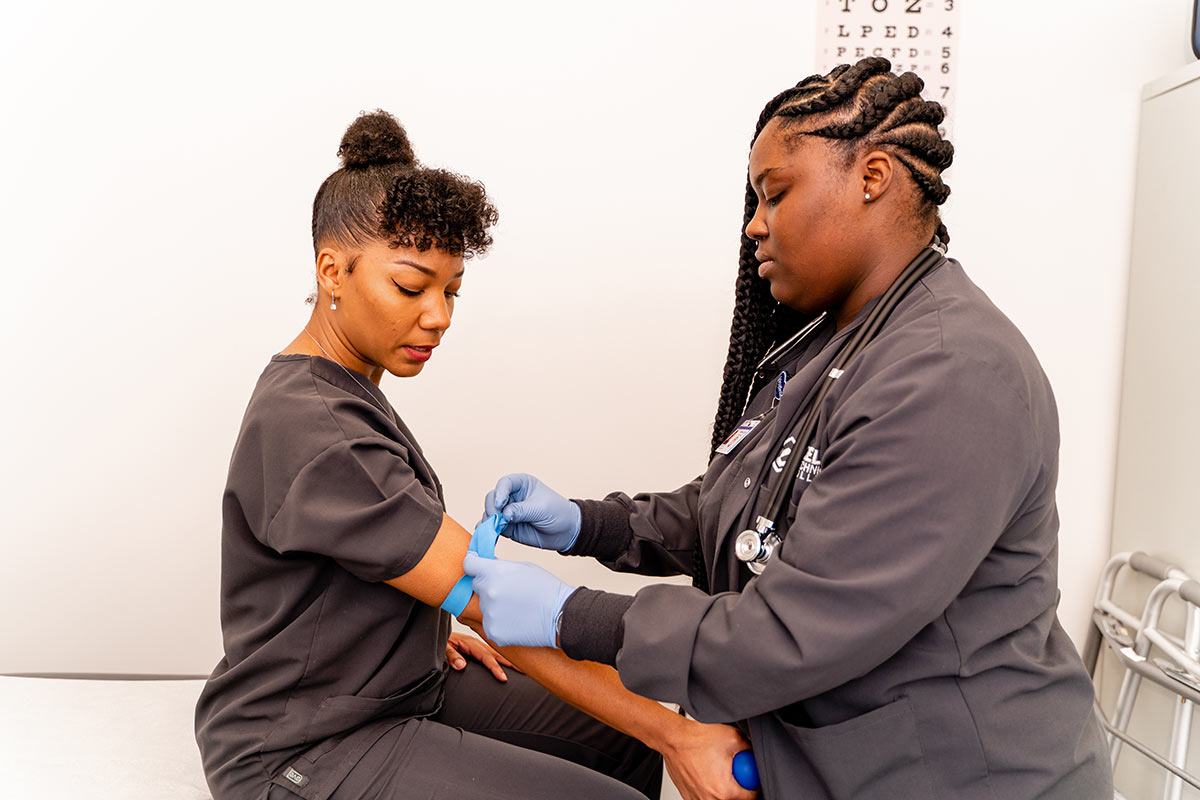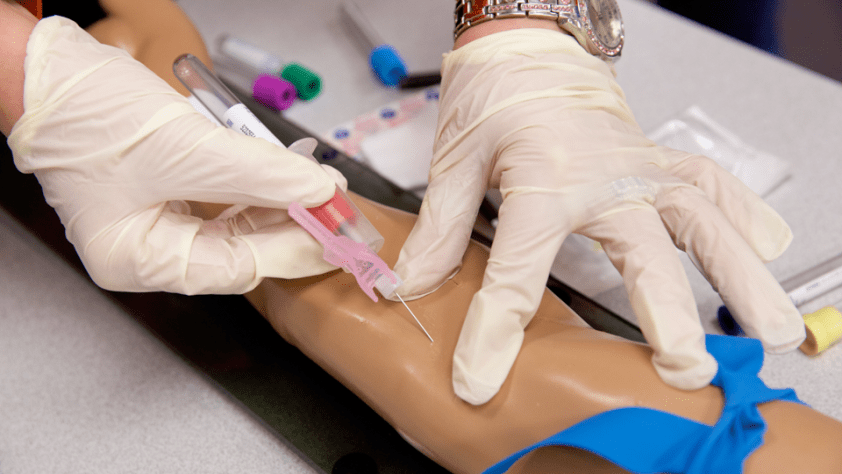Phlebotomy Classes Near Me: What to Bring to Your First Day
Phlebotomy Classes Near Me: What to Bring to Your First Day
Blog Article
The Path to Certification: Comprehending the Phlebotomy Educating Training Course Trip and Its Value
As you take into consideration the course to qualification in phlebotomy, it's important to comprehend the role you'll play in health care. Your training will certainly cover essential skills, from blood collection methods to patient interaction.

The Role of Phlebotomists in Health Care
Phlebotomists play an important duty in the medical care system, working as the essential link in between patients and vital diagnostic testing. You'll execute blood attracts, making sure samples are gathered properly and safely. Your expertise aids in detecting clinical problems, checking health, and guiding treatment choices.
In your day-to-day interactions, you'll require to establish trust fund with patients, making them really feel comfortable during what may be a stressful experience. You are in charge of identifying and handling samples carefully to stop contamination or mistakes, which can influence test outcomes.
Past this, you'll usually work together with physicians and nurses, communicating critical details regarding patients' problems. By grasping your skills, you contribute meaningfully to person care, making you a crucial part of the medical group.
Summary of Phlebotomy Training Programs
When checking out phlebotomy training programs, you'll discover different kinds designed to fit various routines and learning designs. Each program assists you develop necessary skills like blood collection and client communication. Comprehending these options is crucial to selecting the best path for your occupation.
Sorts Of Educating Programs
Numerous sorts of training programs are readily available for those wanting to become efficient in phlebotomy. You can pick from certification programs, which commonly last a few months and concentrate on essential abilities. There are also diploma programs that offer a more thorough education, frequently lasting up to a year. If you're looking for a much deeper understanding, an associate degree in a relevant field may be the best fit. On-line programs provide flexibility for those balancing job or family dedications, allowing you to study at your very own rate. Furthermore, some hospitals and clinics provide on-the-job training programs, supplying sensible experience while you learn. Whatever path you pick, each program aims to equip you with the essential skills for an effective phlebotomy occupation.

Key Abilities Created
Mastering phlebotomy calls for a set of crucial skills that are established through comprehensive training programs. You'll learn technological abilities like appropriate blood vessel option, needle insertion, and blood collection methods. These hands-on techniques assure you can carry out treatments safely and successfully. Additionally, communication abilities are basic; you'll need to communicate with patients, discuss treatments, and put them comfortable. Recognizing composition and physiology is essential, too, as it helps you locate capillaries and comprehend the body's feedback to blood draws. Lastly, you'll gain understanding of safety and security procedures and infection control, ensuring you preserve a sterilized atmosphere. Each of these abilities is crucial for your success as a qualified phlebotomist, making you a beneficial asset in any medical care setup.
Trick Elements of a Phlebotomy Course
In a phlebotomy program, you'll concentrate on vital topics that prepared for your future profession. You'll participate in hands-on training that allows you to use what you have actually found out in real-world setups. Both the curriculum and sensible experience are essential for your success as a phlebotomist.
Curriculum Overview
While seeking a phlebotomy training program, you'll run into a curriculum made to furnish you with fundamental abilities and knowledge. Phlebotomy school. This educational program commonly includes composition and physiology, concentrating on the blood circulation system and recognizing blood components. You'll also learn more about various kinds of blood collection methods, consisting of venipuncture and capillary slit techniques
Furthermore, infection control and safety and security protocols are important elements, ensuring you recognize exactly how to maintain a sterile setting. You'll study patient communication, emphasizing interaction and compassion, which are crucial for alleviating patient stress and anxiety.
Hands-On Training Experience
Getting hands-on experience is an important component of your phlebotomy training program. This sensible training permits you to use what you've discovered in a real-world setting, improving your abilities and self-confidence. Phlebotomy Training Course.
Furthermore, you'll obtain the opportunity to interact with patients, which is necessary for creating your interaction abilities. This combination of technical effectiveness and Your Domain Name social abilities is important for your success as a certified phlebotomist. Inevitably, hands-on training is where concept meets practice, strengthening your knowledge and preparedness for qualification.
Accreditation and Licensing Requirements
Prior to you can begin your profession in phlebotomy, it is essential to understand the certification and licensing demands that differ by state. A lot of states call for phlebotomists to hold a qualification from an acknowledged company, such as the National Phlebotomy Organization or the American Society for Scientific Pathology. These qualifications usually involve passing an examination that evaluates your expertise and skills in the field.
Along with accreditation, some states have certain licensing demands. You may require to complete a particular number of hours in clinical technique, submit evidence of training, or go through a background check. It is necessary to research your state's laws to make certain you meet all needed requirements.
Remaining educated regarding these needs not just helps you secure a setting however additionally boosts your integrity as a specialist. By fulfilling these requirements, you'll be well on your means to an effective occupation in phlebotomy.
Hands-On Training and Practical Experience
Hands-on training and useful experience are vital elements of your phlebotomy education and learning, as they allow you to use academic understanding in real-world scenarios. During your training, you'll involve in monitored venipuncture, discover appropriate techniques, and end up being familiar with numerous blood collection devices. This straight participation is crucial for building your confidence and refining your skills.
You'll work closely with experienced specialists that can guide you with the nuances of individual interaction and example handling. Each method session not just enhances your understanding but likewise prepares you for the fast-paced setting of medical care settings.
In addition, many programs include clinical turnings, allowing you to experience diverse settings, from medical facilities to outpatient clinics. This direct exposure helps you adapt to various difficulties and patient demands, ensuring you're well-prepared for your future function. Embrace these opportunities, as they're necessary to coming to be an experienced and caring phlebotomist.
Challenges Encountered During Training
While obtaining hands-on experience is essential, it's crucial to identify the challenges that can develop during your phlebotomy training. In addition, grasping the abilities required for blood draws takes method; you might battle with method originally.
Time administration can additionally be a hurdle, as harmonizing concept, useful sessions, and personal commitments can really feel challenging. You may encounter differing learning speeds amongst your peers, leading to sensations of insecurity if you believe you're dropping behind. Adapting to the different personalities of teachers can be difficult, as each might have a special training style.
Identifying these challenges at an early stage can prepare you for success and assist you create strength throughout your training trip.
Occupation Opportunities After Accreditation

As you obtain experience, you may even consider specializing in areas like pediatric or senior citizen phlebotomy, satisfying particular person needs. Some phlebotomists choose to progress their careers by coming to be research laboratory service technicians or seeking additional education in health care fields.
Additionally, your qualification can result in functions in training or monitoring brand-new phlebotomists, allowing you to share your understanding. With the healthcare industry continuously growing, your skills will certainly always remain in need, leading the way for a secure and satisfying occupation. Accept the link opportunities awaiting you!
Often Asked Concerns
What Is the Normal Period of a Phlebotomy Training Course?
Phlebotomy training programs normally last around four to eight weeks. You'll participate in hands-on practice, class guideline, and on the internet knowing. Completing this training prepares you for accreditation and a satisfying profession in medical care.
Are Online Phlebotomy Courses Available?
Yes, on-line phlebotomy training courses are offered. They use adaptability and comfort, enabling you to study at your own pace. Just validate the program is accredited to satisfy qualification needs and obtain valuable skills for your occupation.
Exactly How Much Does Phlebotomy Training Typically Expense?
Phlebotomy training typically sets you back between $700 and $2,500, relying on the program and location. You must consider factors like program size, included products, and hands-on experience when selecting the ideal training for you.
What Prevail Prerequisites for Phlebotomy Training?
Usual prerequisites for phlebotomy training typically include a senior high school diploma or GED, booster shots, and a background check. Some programs might likewise need basic medical care expertise or accreditations, guaranteeing you're planned for hands-on training.
Can I Function While Completing My Phlebotomy Training?
Yes, you can function while completing your phlebotomy training. Lots of trainees balance tasks with their research studies, yet make particular to handle your time effectively to assure you satisfy both job and training dedications efficiently.
Report this page